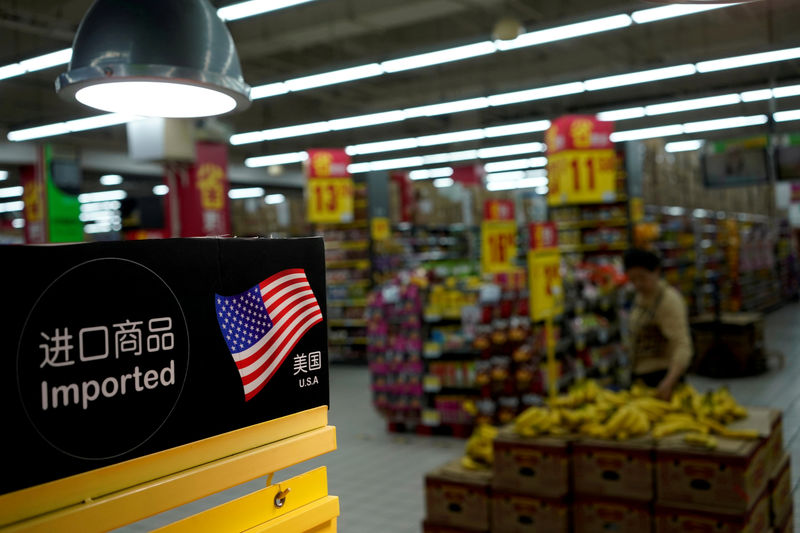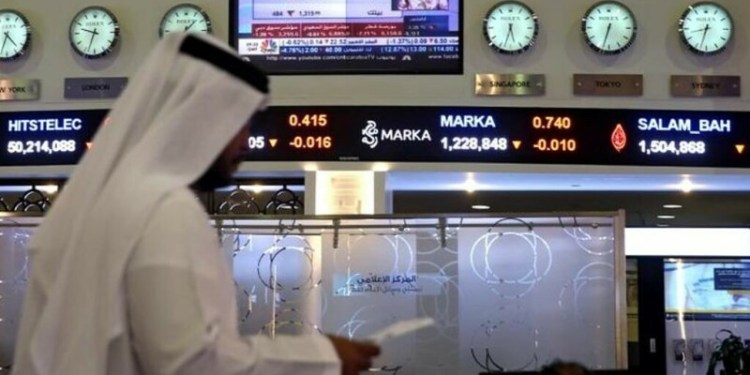 © Reuters. FILE PHOTO: Imports from the U.S. are seen at a supermarket in Shanghai
© Reuters. FILE PHOTO: Imports from the U.S. are seen at a supermarket in ShanghaiBy Elias Glenn and Stella Qiu
BEIJING (Reuters) – The United States is “opening fire” on the world with its threatened tariffs, the Chinese government warned on Thursday, saying Beijing will respond the instant U.S. measures go into effect as the two locked horns in a bitter trade war.
The Trump administration’s tariffs on $34 billion of Chinese imports are due to go into effect at 12.01 am eastern time on Friday (0401 GMT Friday), which is just after midday on Friday Beijing time.
U.S. President Donald Trump has threatened to escalate the trade conflict with tariffs on as much as a total of $450 billion in Chinese goods if Beijing retaliates, with the row roiling financial markets including stocks, currencies and global trade of commodities from soy beans to coal.
China has said it will not “fire the first shot”, but its customs agency said on Thursday in a short statement that Chinese tariffs on U.S. goods will take effect immediately after Washington’s tariffs on Chinese goods kick in.
Speaking at a weekly news conference, Chinese Commerce Ministry spokesman Gao Feng warned the proposed U.S. tariffs would hit international supply chains, including foreign companies in the world’s second-largest economy.
“If the U.S. implements tariffs, they will actually be adding tariffs on companies from all countries, including Chinese and U.S. companies,” Gao said.
“U.S. measures are essentially attacking global supply and value chains. To put it simply, the U.S. is opening fire on the entire world, including itself,” he said.
“China will not bow down in the face of threats and blackmail and will not falter from its determination to defend free trade and the multilateral system.”
Asked whether U.S. companies will be targeted with “qualitative measures” in China in a trade war, Gao said the government will protect the legal rights of all foreign companies in the country.
“We will continue to assess the potential impact of the U.S.-initiated trade war on companies and will help companies mitigate possible shocks.”
Gao said China’s foreign trade is expected to continue on a stable path in the second half, though investors fear a full-blown Sino-U.S. trade dispute will deal a body blow to Chinese exports and its economy.
He emphasized that U.S. tariffs on Chinese exports will hurt both Chinese and foreign firms.
Foreign companies accounted for $20 billion, or 59 percent, of the $34 billion of exports from China that will be subject to new tariffs from the U.S. starting from Friday, with U.S. firms accounting for a significant part of that 59 percent, Gao added.
European officials have told Reuters that China has put pressure on the European Union to issue a strong joint statement against U.S. President Donald Trump’s trade policies, but so far they have insisted on not taking sides..
Chinese stocks were mixed while the yuan slipped slightly against the dollar in early Thursday trading as a targeted cut of reserve requirements for banks took effect amid heightened the trade tensions.
CHINA MEDIA LAMBASTES U.S.
On Thursday, China’s state media lambasted the United States.
The widely-read Global Times tabloid said in an editorial that China must prepare for containment by the United States.
“With strong manufacturing capability and huge market potential, China’s development is difficult to suppress. But the country will encounter more barriers in future development, to which we should learn to adapt,” it said.
“While the Trump administration is anxious about gains and losses, Chinese people have unfaltering confidence in China’s future.”
Both Chinese and U.S. business sources in China said there appeared to be little hope that the tariffs could be averted.
“I’m afraid not, for now,” said Tu Xinquan, a trade expert at Beijing’s University of International Business and Economics, who has advised the Chinese government.
A U.S. industry source said: “There is a 99 percent chance that tariffs go into force on Friday.”
“Frankly, I don’t know what action China could take at the moment that would allow the U.S. to not impose tariffs,” the U.S. source said, adding that there was no evidence the two governments had any substantive engagement at the moment that could lead to the shelving of duties.
A senior Western diplomat told Reuters that there was no sign of any talks at the moment between the two countries, even via back channels.
The industry source said Beijing had been unable to address the Trump administration’s concerns on Chinese trade policies in at least five key area, including forced technology transfers, Chinese industrial overcapacity, government subsidies, SOE reform, and Beijing’s restrictions in the cloud computing industry.
Source: Investing.com



























